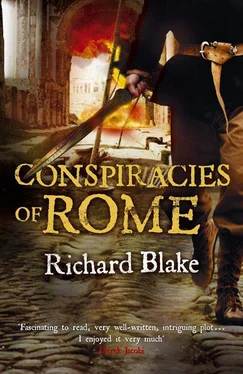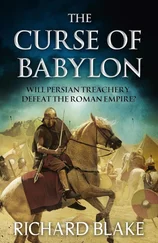Richard Blake - Conspiracies of Rome
Здесь есть возможность читать онлайн «Richard Blake - Conspiracies of Rome» весь текст электронной книги совершенно бесплатно (целиком полную версию без сокращений). В некоторых случаях можно слушать аудио, скачать через торрент в формате fb2 и присутствует краткое содержание. Жанр: Исторические приключения, на английском языке. Описание произведения, (предисловие) а так же отзывы посетителей доступны на портале библиотеки ЛибКат.
- Название:Conspiracies of Rome
- Автор:
- Жанр:
- Год:неизвестен
- ISBN:нет данных
- Рейтинг книги:3 / 5. Голосов: 1
-
Избранное:Добавить в избранное
- Отзывы:
-
Ваша оценка:
- 60
- 1
- 2
- 3
- 4
- 5
Conspiracies of Rome: краткое содержание, описание и аннотация
Предлагаем к чтению аннотацию, описание, краткое содержание или предисловие (зависит от того, что написал сам автор книги «Conspiracies of Rome»). Если вы не нашли необходимую информацию о книге — напишите в комментариях, мы постараемся отыскать её.
Conspiracies of Rome — читать онлайн бесплатно полную книгу (весь текст) целиком
Ниже представлен текст книги, разбитый по страницам. Система сохранения места последней прочитанной страницы, позволяет с удобством читать онлайн бесплатно книгу «Conspiracies of Rome», без необходимости каждый раз заново искать на чём Вы остановились. Поставьте закладку, и сможете в любой момент перейти на страницу, на которой закончили чтение.
Интервал:
Закладка:
We set out on fresh horses. I could feel the definite return of health and strength, and I delighted in the warm sea breeze and my clean clothing.
We skirted Rimini. I could see from a distant inspection that this was still a substantial town within its walls. But Lucius insisted we shouldn’t spend any time there. Except for our inexplicable brush on the third afternoon of our journey, we’d passed unchallenged.
‘Best not push our luck,’ he said, after pointing out the main sights that could be seen above the distant walls. ‘You can tour to your heart’s content once our business with the exarch is out of the way.’
In the early afternoon, we entered a small town. This had shrivelled to a core within its walls. Most of the buildings outside this core had collapsed, and some of the materials had been used again for the construction of churches or heavier fortifications. But it had a bustling market and a wine shop where we could sit down and eat our first proper meal in days. Lucius fed me some thin gruel sweetened with honey to cover the bitterness of the drugs he’d added. I managed to swallow most of this. He kept the wine heavily watered.
‘Can’t have you drunk as well as half dead,’ he joked.
We went for a walk round the centre of the town. I demanded this much, and I leaned heavily on him as we inspected the surviving buildings. There was a fine basilica there, now used as a monastery. An inscription above the portico recorded that the building had been provided by the munificence of a certain Gordianus in the reign of Claudius the Goth Killer. It was an interesting example from a time when architectural styles were on the turn from the elegant but ancient to the more functional modern.
There was a public library. But Lucius flatly refused to let me enter. He’d never seen me at work in Rome. But he probably guessed how time could stand still for me whenever I found myself in a room with books.
There was also a tiny church built by the mother of Constantine shortly after his conversion. This had been changed and extended over the years, and now had a bell tower that stood incongruously beside it.
‘Are you up to climbing this?’ Lucius asked. ‘I can show you something that will raise your spirits.’
I nodded. He helped me up the narrow steps to the top. I clutched with my good arm at the wooden rail, wondering at how little strength I could put into the grip. Even so, I could feel the gradual return of strength. Young bodies have the most wondrous resilience. The fever had not been great, and now it was passing.
At the top, Lucius leant over the northern parapet. ‘Do you see that blur in the distance?’ he asked.
I looked. Before me lay an immense flat waste, an embanked road leading through it until lost in the heat haze. Far beyond, almost on the horizon, I saw what Lucius was pointing at. It was a blur at first. But I focused and concentrated. Through the low, shimmering air, I could see a high and wide expanse of domes and towers.
There were miles and miles yet to go. But I’d had my first sight of Ravenna – that great, untakeable fastness perched between a marsh and the sea. From here, the last Western emperors had ruled Italy as best they could, safe from the general havoc that lapped or overpoured the walls of every other city. From here, the exarch now ruled, in continual touch by sea with Constantinople and the world that stretched far beyond the narrow confines of the West.
Within those walls lay the last undamaged fragments of the old Roman life – the palaces and libraries and bathhouses and trading marts, and the large remains of an urban culture to which all Italy had once been home.
‘We’ll be there tomorrow,’ Lucius said. ‘Once I’ve got you bathed and rested, we’ll take ourselves to the exarch. I would have sent a slave ahead to alert him to our coming. In the present circumstances, it may be best for us simply to arrive unannounced at his door.’
Back down in the square before the church, I felt decidedly better. We’d outrun the dispensator’s men. Another day, and I’d be in the fabled Ravenna of the exarch. And I could hope for the answers to which I’d been laying impatient and not always advisable siege since that awful dawn by the Column of Phocas.
Whatever it meant for me, I swore, I’d have those answers.
After a brief and merciful rest, we set out again on the road. Before nightfall, we’d be travelling through that great marsh within which Ravenna was protected from all enemies. Some time the following day, we could expect to pass through the immense fortifications.
Yes, I’d have those answers.
47
We were deep into the marshes that protected Ravenna on its landward side. Still straight, the road passed across on a high causeway. Every mile or so, we were stopped and questioned at one of the military checkpoints that blocked the only approach to the city. Each time, Lucius showed his letter of safe conduct, and we passed through.
The marshes went on for miles. We’d made our gradual descent onto them in the morning. Now I was grown almost used to their hot, stinking air.
I asked how the city could possibly survive in a climate so pestilential.
‘The city itself has the most wonderful air,’ Lucius explained.
Just before Ravenna, he continued, the marshes gave way to more solid ground. Part of the city was built on this, part on moles sunk deep into the coastal mud. The continual breeze from the Adriatic gave it an unexpectedly fine climate. The gentle movement of the tide washed sea water in and out twice a day through the canals that intersected much of the city. This carried away all the filth and other refuse that would otherwise have remained to fester into an epidemic. Such infections as did take hold in the city were carried in along the shipping lanes from the world outside. Even these were less terrible than when they reached Rome or any of the inland cities.
It was less fortunate for those armies anyone was mad enough to send against the city. Every one of these had sickened and shrivelled away. The only need for an armed garrison was to keep order inside the walls and to guard the causeway that led across the marshes.
‘If it’s churches you like, you’ll love Ravenna,’ said Lucius. ‘The place has been filling up with them for centuries. Even I can appreciate some of the craftsmanship that went into their creation. One of these days, they will all be turned over to the worship of the Old Gods. Even then, however, I hope we can keep some of the mosaics in them. Some might have to be painted over. The rest, though, can be put to a more fitting use than they were designed for.’
Lucius explained his plan for rolling back Christianity. It required another Julian. But this one wouldn’t throw his life away on trying to imitate Alexander the Great’s conquest of Persia. This emperor would take up the failed project of complete religious toleration. All forms of worship would be protected. But the Old Religion would be again the established faith. Only its adherents would be allowed to serve in the army and administration. Only they would be allowed to teach in any institute of higher learning.
‘And this is only fair,’ said Lucius. ‘How can someone who believes the Old Gods are demons possibly teach an ancient literature that was created to glorify them? How can he celebrate and encourage emulation of the lives of heroes who his Church insists are burning in Hell?
‘It’s really as if I were given the job of preaching the Gospels. With my best effort, I’d make a mess of it. So I’m hardly insisting on the unreasonable. Let them preach the word of their Jewish carpenter. I’d never dream of stopping them. In return, let them stick to that. Everything else must be for my people. Each to his own. What could be fairer than that?’
Читать дальшеИнтервал:
Закладка:
Похожие книги на «Conspiracies of Rome»
Представляем Вашему вниманию похожие книги на «Conspiracies of Rome» списком для выбора. Мы отобрали схожую по названию и смыслу литературу в надежде предоставить читателям больше вариантов отыскать новые, интересные, ещё непрочитанные произведения.
Обсуждение, отзывы о книге «Conspiracies of Rome» и просто собственные мнения читателей. Оставьте ваши комментарии, напишите, что Вы думаете о произведении, его смысле или главных героях. Укажите что конкретно понравилось, а что нет, и почему Вы так считаете.












